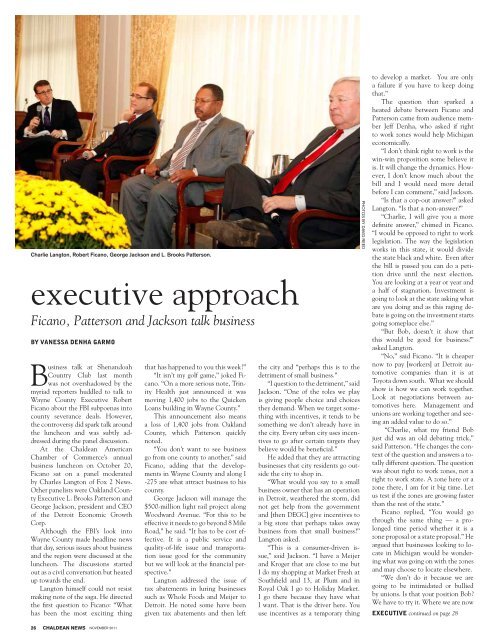NOVEMBER 2011
Create successful ePaper yourself
Turn your PDF publications into a flip-book with our unique Google optimized e-Paper software.
Charlie Langton, Robert Ficano, George Jackson and L. Brooks Patterson.<br />
executive approach<br />
Ficano, Patterson and Jackson talk business<br />
By Vanessa Denha Garmo<br />
Business talk at Shenandoah<br />
Country Club last month<br />
was not overshadowed by the<br />
myriad reporters huddled to talk to<br />
Wayne County Executive Robert<br />
Ficano about the FBI subpoenas into<br />
county severance deals. However,<br />
the controversy did spark talk around<br />
the luncheon and was subtly addressed<br />
during the panel discussion.<br />
At the Chaldean American<br />
Chamber of Commerce’s annual<br />
business luncheon on October 20,<br />
Ficano sat on a panel moderated<br />
by Charles Langton of Fox 2 News.<br />
Other panelists were Oakland County<br />
Executive L. Brooks Patterson and<br />
George Jackson, president and CEO<br />
of the Detroit Economic Growth<br />
Corp.<br />
Although the FBI’s look into<br />
Wayne County made headline news<br />
that day, serious issues about business<br />
and the region were discussed at the<br />
luncheon. The discussions started<br />
out as a civil conversation but heated<br />
up towards the end.<br />
Langton himself could not resist<br />
making note of the saga. He directed<br />
the first question to Ficano: “What<br />
has been the most exciting thing<br />
that has happened to you this week?”<br />
“It isn’t my golf game,” joked Ficano.<br />
“On a more serious note, Trinity<br />
Health just announced it was<br />
moving 1,400 jobs to the Quicken<br />
Loans building in Wayne County.”<br />
This announcement also means<br />
a loss of 1,400 jobs from Oakland<br />
County, which Patterson quickly<br />
noted.<br />
“You don’t want to see business<br />
go from one county to another,” said<br />
Ficano, adding that the developments<br />
in Wayne County and along I<br />
-275 are what attract business to his<br />
county.<br />
George Jackson will manage the<br />
$500-million light rail project along<br />
Woodward Avenue. “For this to be<br />
effective it needs to go beyond 8 Mile<br />
Road,” he said. “It has to be cost effective.<br />
It is a public service and<br />
quality-of-life issue and transportation<br />
issue good for the community<br />
but we will look at the financial perspective.”<br />
Langton addressed the issue of<br />
tax abatements in luring businesses<br />
such as Whole Foods and Meijer to<br />
Detroit. He noted some have been<br />
given tax abatements and then left<br />
the city and “perhaps this is to the<br />
detriment of small business.”<br />
“I question to the detriment,” said<br />
Jackson. “One of the roles we play<br />
is giving people choice and choices<br />
they demand. When we target something<br />
with incentives, it tends to be<br />
something we don’t already have in<br />
the city. Every urban city uses incentives<br />
to go after certain targets they<br />
believe would be beneficial.”<br />
He added that they are attracting<br />
businesses that city residents go outside<br />
the city to shop in.<br />
“What would you say to a small<br />
business owner that has an operation<br />
in Detroit, weathered the storm, did<br />
not get help from the government<br />
and [then DEGC] give incentives to<br />
a big store that perhaps takes away<br />
business from that small business?”<br />
Langton asked.<br />
“This is a consumer-driven issue,”<br />
said Jackson. “I have a Meijer<br />
and Kroger that are close to me but<br />
I do my shopping at Market Fresh at<br />
Southfield and 13, at Plum and in<br />
Royal Oak I go to Holiday Market.<br />
I go there because they have what<br />
I want. That is the driver here. You<br />
use incentives as a temporary thing<br />
Photos by David Reed<br />
to develop a market. You are only<br />
a failure if you have to keep doing<br />
that.”<br />
The question that sparked a<br />
heated debate between Ficano and<br />
Patterson came from audience member<br />
Jeff Denha, who asked if right<br />
to work zones would help Michigan<br />
economically.<br />
“I don’t think right to work is the<br />
win-win proposition some believe it<br />
is. It will change the dynamics. However,<br />
I don’t know much about the<br />
bill and I would need more detail<br />
before I can comment,” said Jackson.<br />
“Is that a cop-out answer?” asked<br />
Langton. “Is that a non-answer?”<br />
“Charlie, I will give you a more<br />
definite answer,” chimed in Ficano.<br />
“I would be opposed to right to work<br />
legislation. The way the legislation<br />
works in this state, it would divide<br />
the state black and white. Even after<br />
the bill is passed you can do a petition<br />
drive until the next election.<br />
You are looking at a year or year and<br />
a half of stagnation. Investment is<br />
going to look at the state asking what<br />
are you doing and as this raging debate<br />
is going on the investment starts<br />
going someplace else.”<br />
“But Bob, doesn’t it show that<br />
this would be good for business?”<br />
asked Langton.<br />
“No,” said Ficano. “It is cheaper<br />
now to pay [workers] at Detroit automotive<br />
companies than it is at<br />
Toyota down south. What we should<br />
show is how we can work together.<br />
Look at negotiations between automotives<br />
here. Management and<br />
unions are working together and seeing<br />
an added value to do so.”<br />
“Charlie, what my friend Bob<br />
just did was an old debating trick,”<br />
said Patterson. “He changes the context<br />
of the question and answers a totally<br />
different question. The question<br />
was about right to work zones, not a<br />
right to work state. A zone here or a<br />
zone there, I am for it big time. Let<br />
us test if the zones are growing faster<br />
than the rest of the state.”<br />
Ficano replied, “You would go<br />
through the same thing — a prolonged<br />
time period whether it is a<br />
zone proposal or a state proposal.” He<br />
argued that businesses looking to locate<br />
in Michigan would be wondering<br />
what was going on with the zones<br />
and may choose to locate elsewhere.<br />
“We don’t do it because we are<br />
going to be intimidated or bullied<br />
by unions. Is that your position Bob?<br />
We have to try it. Where we are now<br />
EXECUTIVE continued on page 28<br />
26 CHALDEAN NEWS <strong>NOVEMBER</strong> <strong>2011</strong>

















